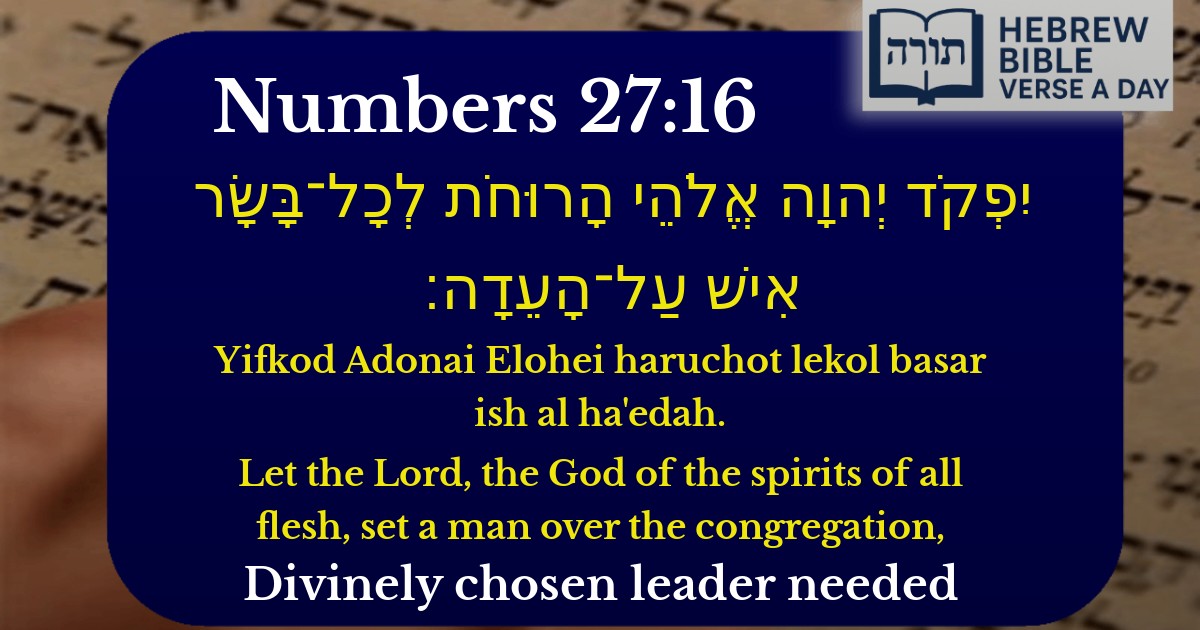Join Our Newsletter To Be Informed When New Videos Are Posted
Join the thousands of fellow Studends who rely on our videos to learn how to read the bible in Hebrew for free!
Hebrew Text
יִפְקֹד יְהוָה אֱלֹהֵי הָרוּחֹת לְכָל־בָּשָׂר אִישׁ עַל־הָעֵדָה׃
English Translation
Let the Lord, the God of the spirits of all flesh, set a man over the congregation,
Transliteration
Yifkod Adonai Elohei haruchot lekol basar ish al ha'edah.
Hebrew Leining Text
יִפְקֹ֣ד יְהֹוָ֔ה אֱלֹהֵ֥י הָרוּחֹ֖ת לְכׇל־בָּשָׂ֑ר אִ֖ישׁ עַל־הָעֵדָֽה׃
יִפְקֹ֣ד יְהֹוָ֔ה אֱלֹהֵ֥י הָרוּחֹ֖ת לְכׇל־בָּשָׂ֑ר אִ֖ישׁ עַל־הָעֵדָֽה׃
🎵 Listen to leining
Parasha Commentary
📚 Talmud Citations
This verse is quoted in the Talmud.
📖 Yoma 22b
The verse is referenced in a discussion about leadership and the qualities required for those who lead the congregation.
📖 Sanhedrin 8a
The verse is cited in the context of appointing leaders and the divine aspect of leadership selection.


Understanding the Verse
The verse, "יִפְקֹד יְהוָה אֱלֹהֵי הָרוּחֹת לְכָל־בָּשָׂר אִישׁ עַל־הָעֵדָה" (Bamidbar 27:16), appears in the context of Moshe Rabbeinu's plea to Hashem to appoint a successor to lead Bnei Yisrael after his passing. The phrase "אֱלֹהֵי הָרוּחֹת לְכָל־בָּשָׂר" ("God of the spirits of all flesh") is particularly significant and is expounded upon by our commentators.
Rashi's Explanation
Rashi (Bamidbar 27:16) explains that this title for Hashem emphasizes His omniscience and understanding of each individual's unique nature. The term "רוּחֹת" (spirits) is plural, indicating that Hashem knows the diverse temperaments, thoughts, and inclinations of every person. Therefore, Moshe requests a leader who can relate to and guide each member of the congregation according to their individual needs.
Rambam's Perspective
In Hilchos De'os (1:6), the Rambam discusses the importance of a leader's ability to understand and relate to different personalities. This aligns with Moshe's request for a leader appointed by "אֱלֹהֵי הָרוּחֹת", who can navigate the complexities of human nature with wisdom and compassion.
Midrashic Insights
The Midrash (Bamidbar Rabbah 21:15) elaborates that Moshe's choice of words reflects his deep concern for Klal Yisrael. By invoking "אֱלֹהֵי הָרוּחֹת", Moshe underscores that the future leader must be capable of unifying the people despite their differences, just as Hashem oversees and understands every individual spirit.
Key Themes